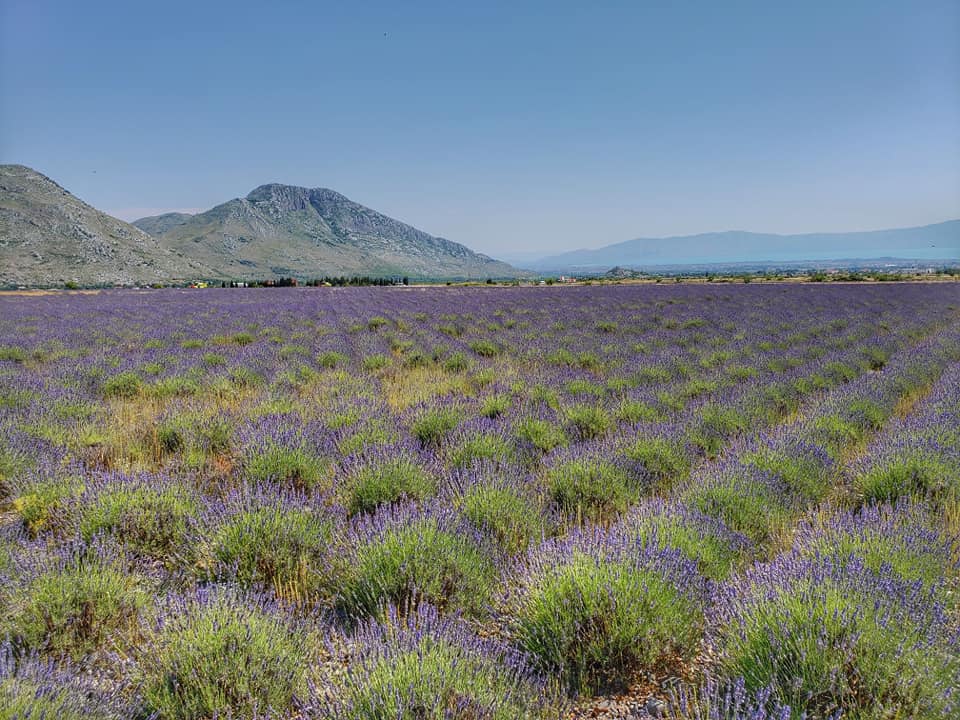Situated in the heart of the Balkans, Albania has made many headlines over the years for the illegal cultivation and export of cannabis, but few know about its thriving and legal medicinal herb sector. Currently, the country cultivates some 330 types of medicinal herbs, with 186 varieties exported worldwide. In addition, it employs tens of thousands of people and places the country among the global leaders for the export of sage and lavender.
While this might all sound great, issues like property rights, lack of investment, and migration are creating challenges for farmers.
Two and a half hours from the capital of Tirana, the town of Koplik sits nestled in the shadow of the Accursed Mountains. Here, during the summer, the scent of warm lavender fills the air, lulling passing drivers into a state of calm as they make their way through the winding roads. But as autumn comes, production switches to turning and replanting for the season ahead.
Figures toil amongst the rocky earth- women with white headscarves, bronzed men with wiry frames and weather-worn skin work with lavender, everlasting flower, and juniper.
“I am Ervin Çeraj, and I have a mainly family business where two people are employed, but depending on the working season, there are 10 other seasonal workers who we have contracted. Our work covers a land area of about 10 hectares,” he told Exit.
Cultivating medicinal plants to generate income is a tradition in Ervin’s family, and in recent years they have increased production and started distilling essential oils.
“We produce helichrysum oil, sage oil, lavender oil, thymus oil, oregano and thyme. We keep changing the varieties we cultivate, depending on the demand of the market. For example, If the market has no demand for lavender, we don’t cultivate it anymore and we plant sage.”
More than 100,000 Albanian households are engaged in the medicinal herb trade, equivalent to one in seven families. The sector generates up to $48 million in exports that wing their way overseas to make essential oils, herbal remedies, and garnishes in fancy restaurants. Farmers say the industry’s potential is at least double its current volume.
Ervin adds that recently, there has been a constant demand, mainly for sage, the price has been constantly increasing, and all the products have been sold.
In the mountains, the sector has a big impact on the local economy and people work tirelessly, roaming the peaks and valleys to gather flowers and leaves from the wild. Their bounty is then carried by hand, often hoisted high on their backs, to local towns where it is sold to companies who process it.
Landi Skora owns one such company. It harvests herbs but also processes those gathered by others.
“We started a business in November 2010. And it started with the idea of producing some small batch, high-quality essential oils, and our first distillery was built here in Tirana. We moved up north Kopik or Malesia e Madhe, and that’s where 90% of our business here is right now. And we distil about seven different essential oils, but we are the largest essential oil exporter in Albania and the neighbouring countries now. We export everything in the United States,” he explained.
Each year, Landi’s company harvests 1000 tons of helichrysum, 300 tons of lavender, 300 tons of juniper, and 200 tons of bay leaf, all turning into essential oils. But issues such as quality- due to inexperienced farmers being unaware of best practices in pesticides and chemical use, and land registry issues persist.
Landi said, “There’s the small plots by different people are very hard to get because they don’t have any documents on them. So for us as a business to expand, we have to suffer a lot trying to find the right land. And when we do that land doesn’t have deeds on it.”
Most of Albania’s land was seized by the state during communism and after the fall of the regime, many people either took back their land or settled what they could. The legalisation process is time-consuming and expensive, and in rural areas, lack of deeds remains an issue.
Armand, a farmer from Malesia, adds that the lack of ownership documents also makes it hard for farmers to get government grants or EU assistance.
“Because if someone is going to invest in the long term, the lands must be licensed. And many farmers are unable to get involved in various support programs, whether Albanian or foreign, because of the problem with ownership,” he said.
But even if these issues were to be resolved, the elephant in the room remains migration.
Albanians have been leaving their country for centuries, but the latest waves are leaving entire villages devoid of young people. Over 700,000 people are estimated to have left in the last decade, particularly from the country’s north and more rural areas where the medicinal herb trade is located.
Landi explains that “One of the main obstacles in our industry is labour. There aren’t many people now to work in the fields, mostly because of migration. The old people are still there, they still work, but just they’re there, they don’t have enough strength anymore to do what needs to be done.”
Armand recognises the issue with migration but hopes that by the time the current generation of workers retire, the industry will be mostly mechanised.
“Farmers usually work with the same people and so far, migration isn’t an issue as its young people leaving and older people working in the farms. Only after the cycle with the older workers is closed, will it be felt but by then we will have mechanised 70% of the sector, I hope.”
Ervin agrees,”The only way to cope with the worker deficit is by investing in agricultural machinery. We have started investing in machines as there is no labour force and we must get work done. We constantly suffer from young people leaving, but also because not many people want to work in manual labour in the fields.”
But these machines do not come cheap and are difficult to maintain as there is only one local technician, and parts can only be bought in the south of the country. For most smaller farmers to invest in machines, first the issue of property rights must be solved, and then they will need government support.
: Landi explains that the state has focussed on other industries such as wine and dairy, leaving medicinal herbs to essentially fend for themselves.
“We need to mechanise but mechanisation for a farmer is pretty much impossible unless the government helps in with grants of different forms. And in the past two, three years the government has left our industry sort of out there fending for our own.”
Armand, however, is satisfied with government support and explains the state subsidies farmers with around EUR 500 per hectare as well as fuel subsidies based on the size of their land.
”It’s first-hand assistance that affects the farmer, removing a significant part of the expenses incurred in order to carry out annual processes like harvesting. I think that, in recent years, there has been support given by the government, in cooperation with European Union funds, directly helping farmers. I think it has directly impacted them,” he said.
While they may be short on workers, the farmers have plenty of optimism. Landi explains he is planning to double farming land and exports in the next few years, as long as these issues can be ironed out.
“We’re still only able to do 40% of our demand. We can supply more. So we’re still growing. We should be the leading exporter of essential oils in the region.We can become that.”
Armand is also optimistic, ”I think that the future of this industry is safe because the demand for the products of this industry is great. I believe that Malesia e Madhe will be a role model, not only for Albania, but also for the Balkans, in the cultivation and industry of medicinal plants. That is certain!
With budding potential and plenty of enthusiasm on the ground, Albania’s herbal future seems likely to blossom, but the very present issue of replacing manual labour with machines, while trying to find funds to buy them and legalising land could stunt growth. It may well be several more harvests before the country’s herb farmers and gathers witness the sector reaching its full potential.
Follow The Balkanista!


